Abstract
1 Eight men with primary hypertension were treated for 3 weeks with placebo, epanolol (200 mg or 400 mg), or atenolol 100 mg in a randomised cross-over study. Each active treatment period was preceded by a 3 week placebo treatment period and both investigators and subjects were blind to the active drug sequence. 2 At the end of each period, measurements were made of resting cardiovascular (heart rate, blood pressure, forearm blood flow) and biochemical variables (plasma renin, angiotensin II, aldosterone, adrenaline, noradrenaline, vasopressin, sodium and potassium concentrations and osmolality). Responses to exercise (including gas exchange, sweat rate, and ratings of perceived exertion) and the reflex cardiovascular adjustments to distal body subatmospheric pressure were also assessed. 3 The reduction of exercise-induced tachycardia by epanolol 400 mg was comparable to that of atenolol. There was very little difference in the effects of atenolol or epanolol 400 mg on resting blood pressure, but in both cases blood pressures were usually significantly lower than with epanolol 200 mg. 4 Although each active treatment influenced the renin-angiotensin system and circulating levels of catecholamines, the exercise-induced reduction in blood pressure was unaffected. Thus, the hypotensive effects of pharmacological and non-pharmacological interventions were additive.
Full text
PDF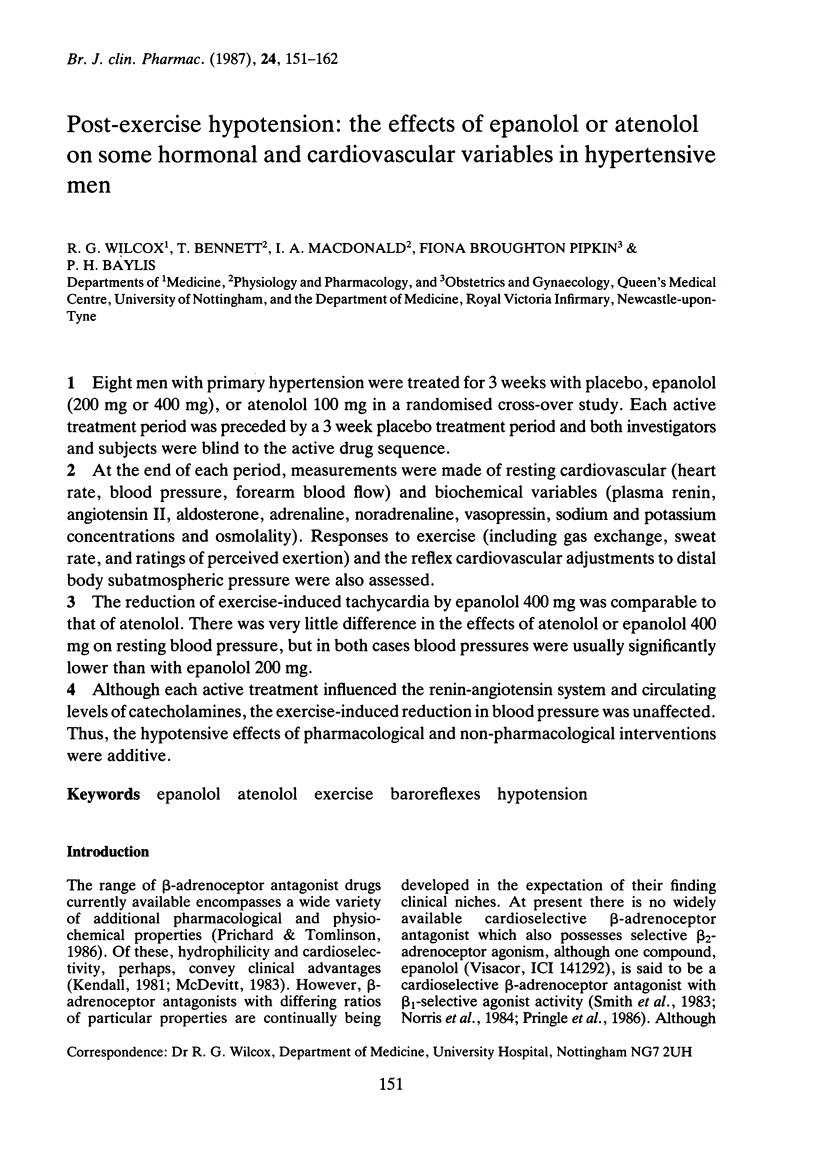
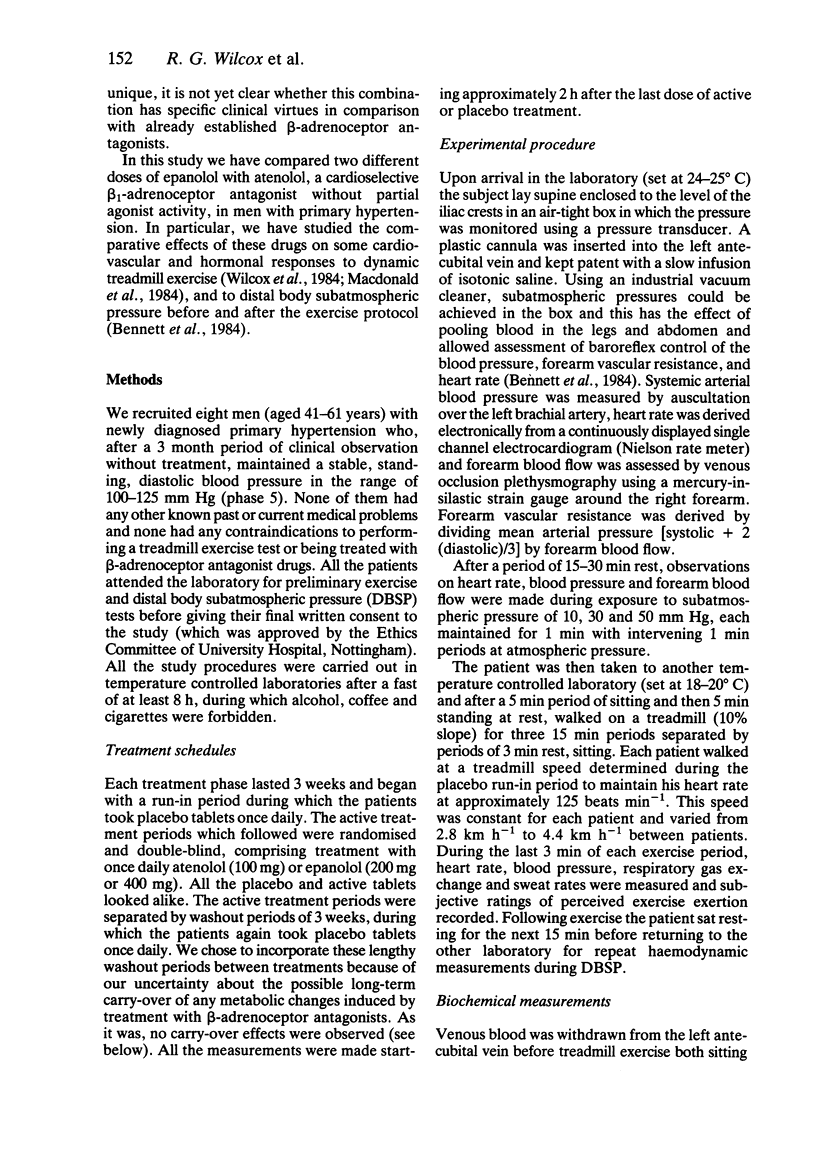
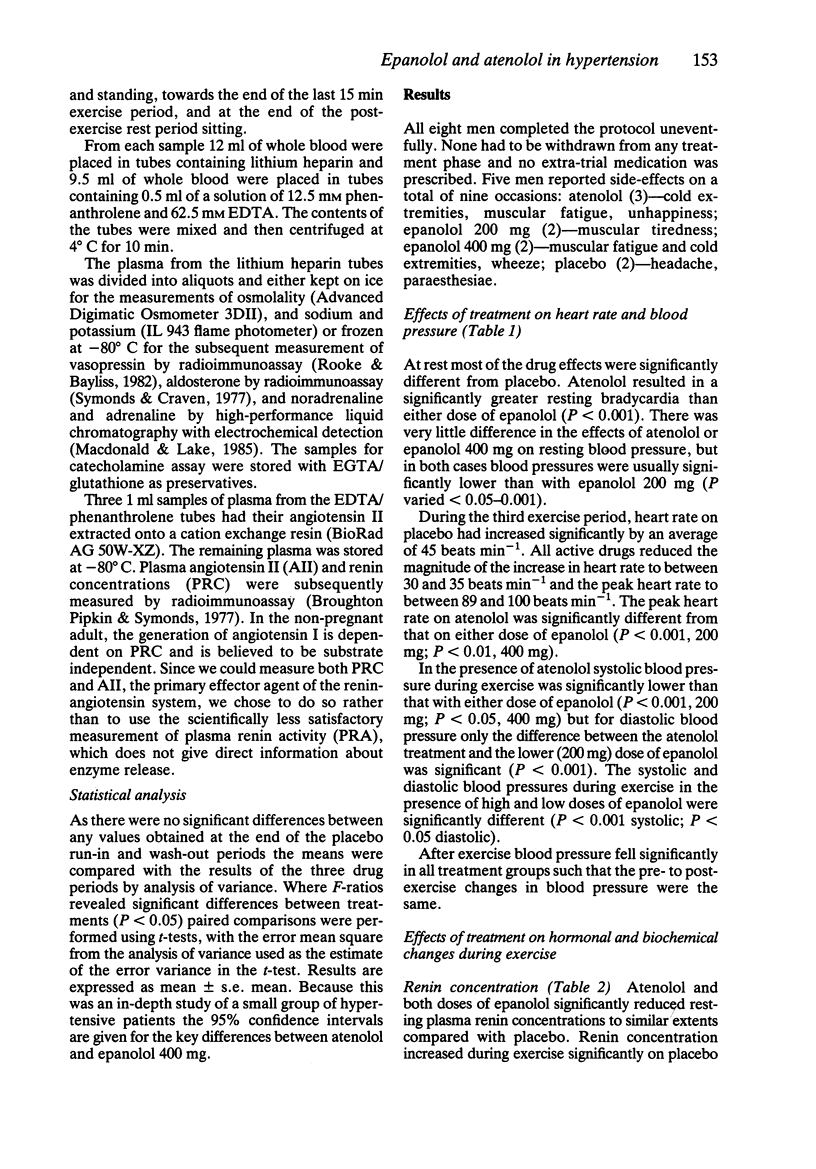
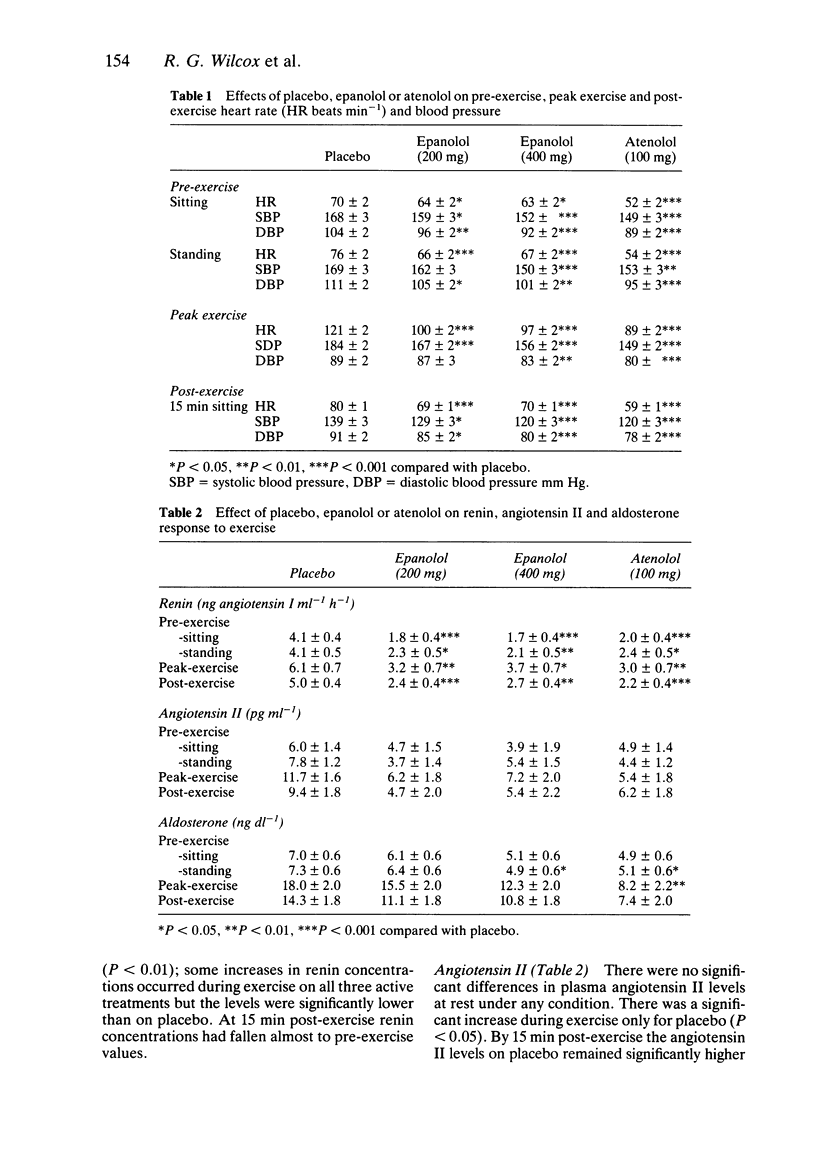
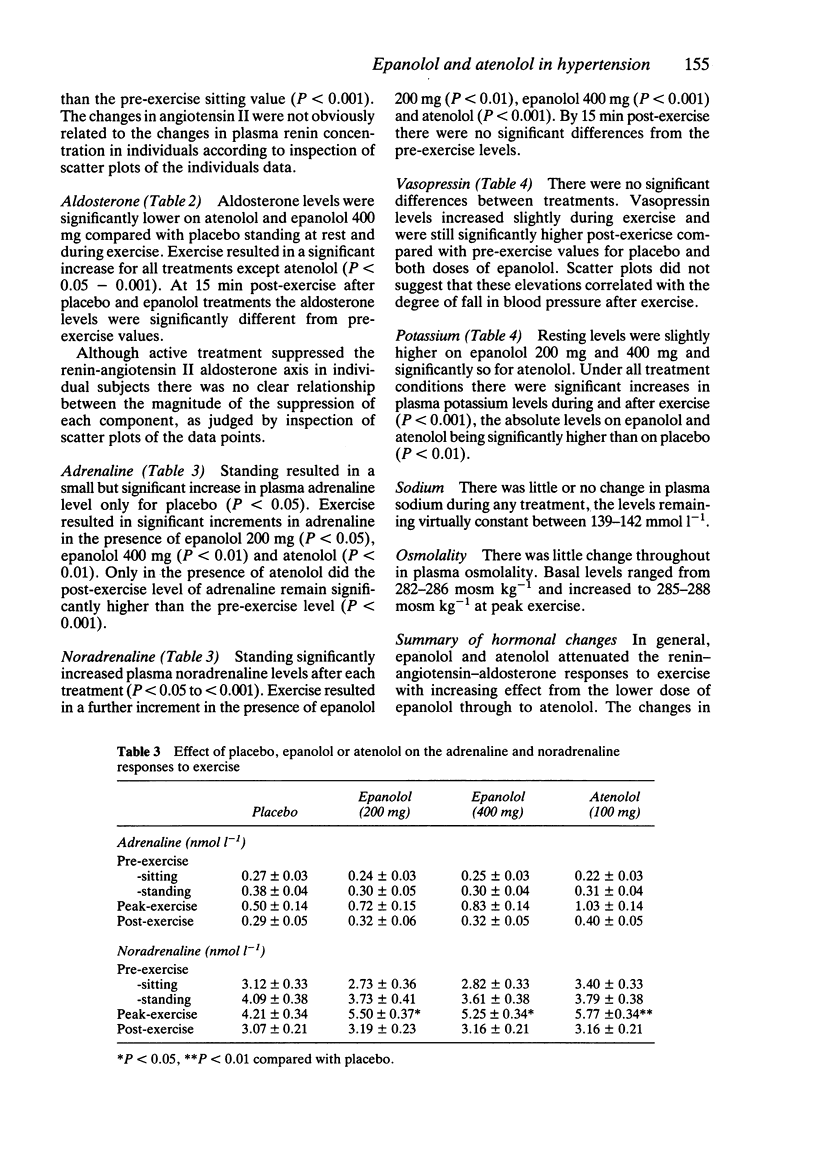
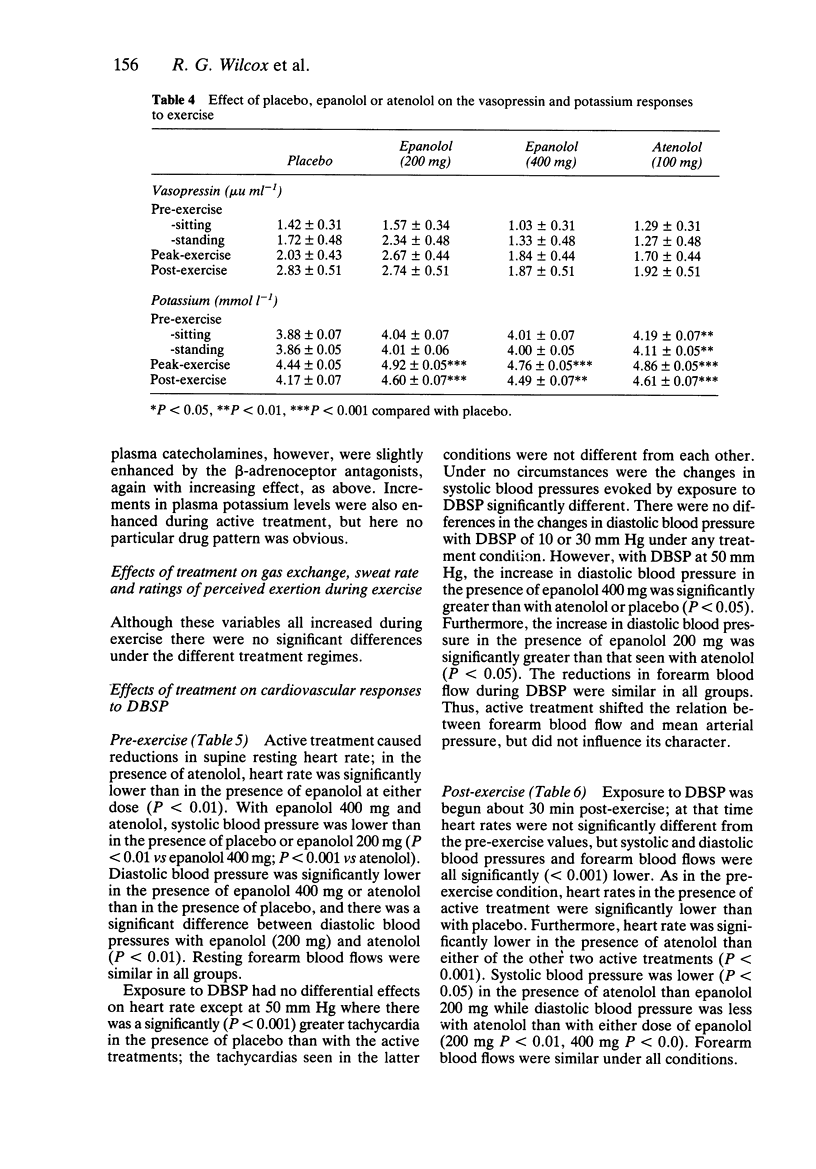
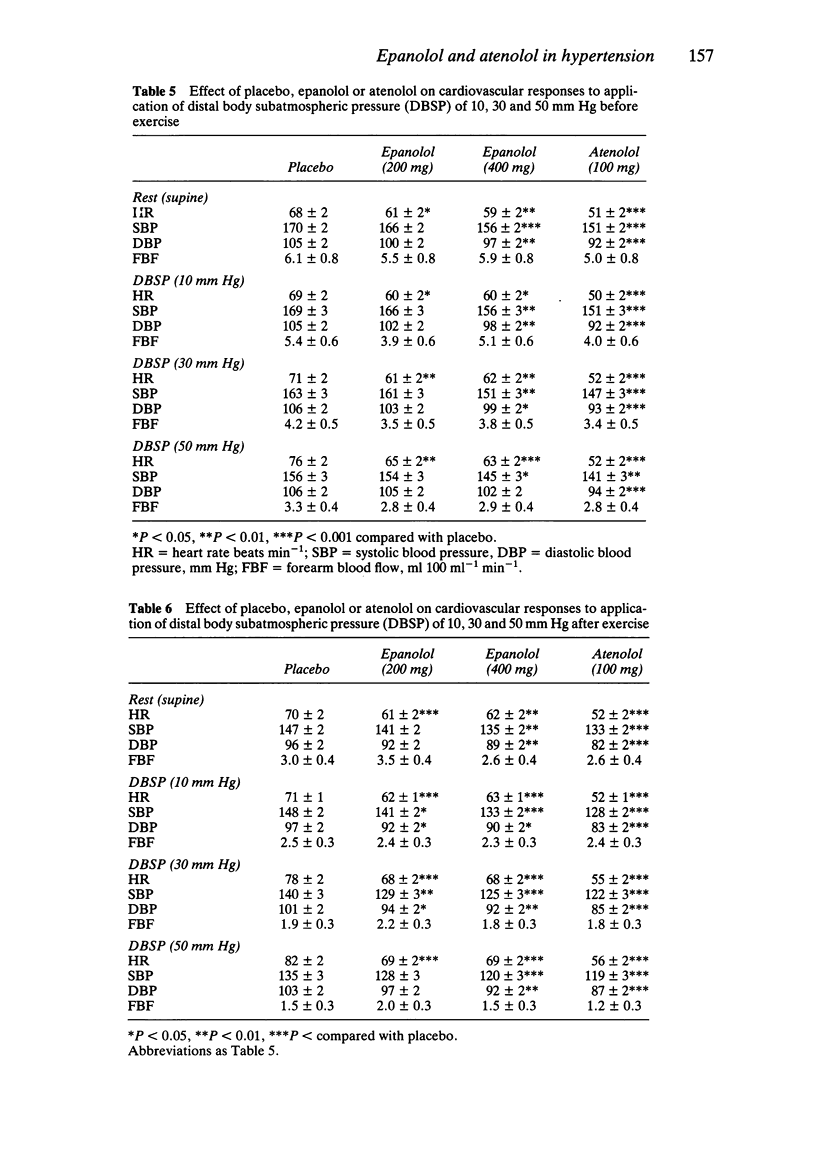
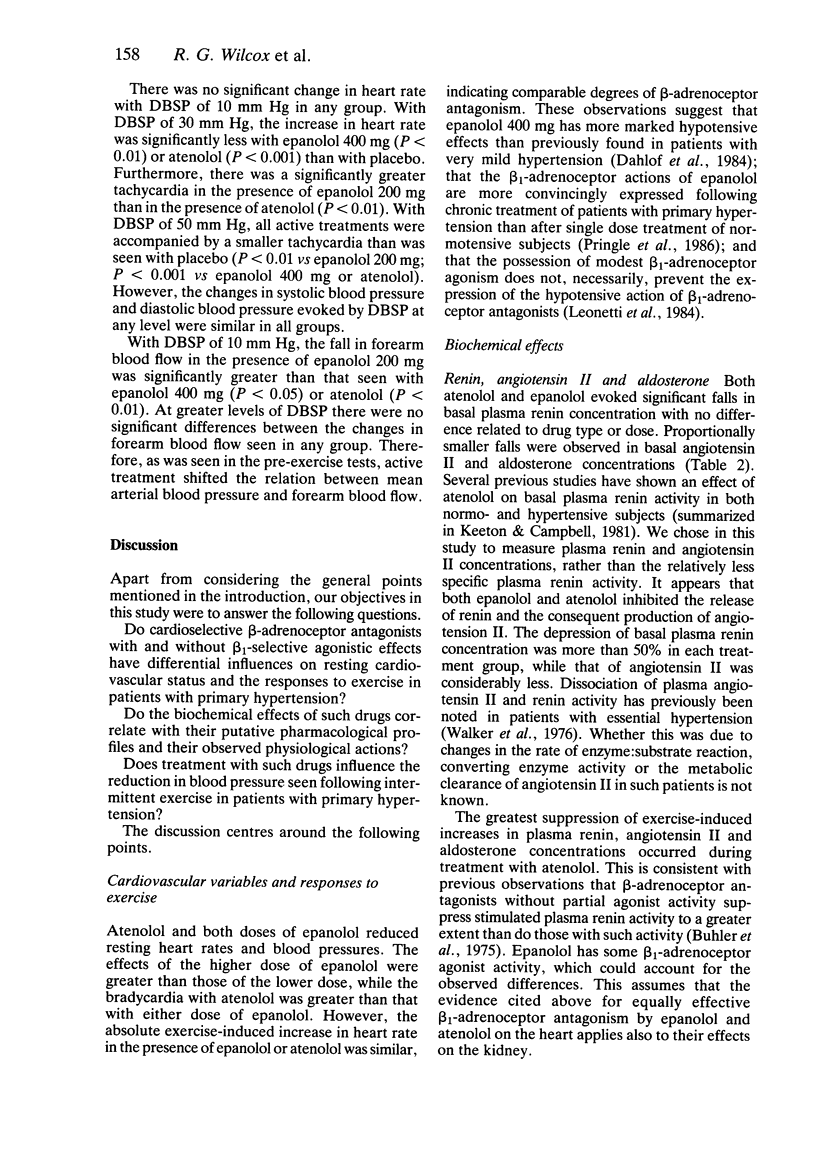
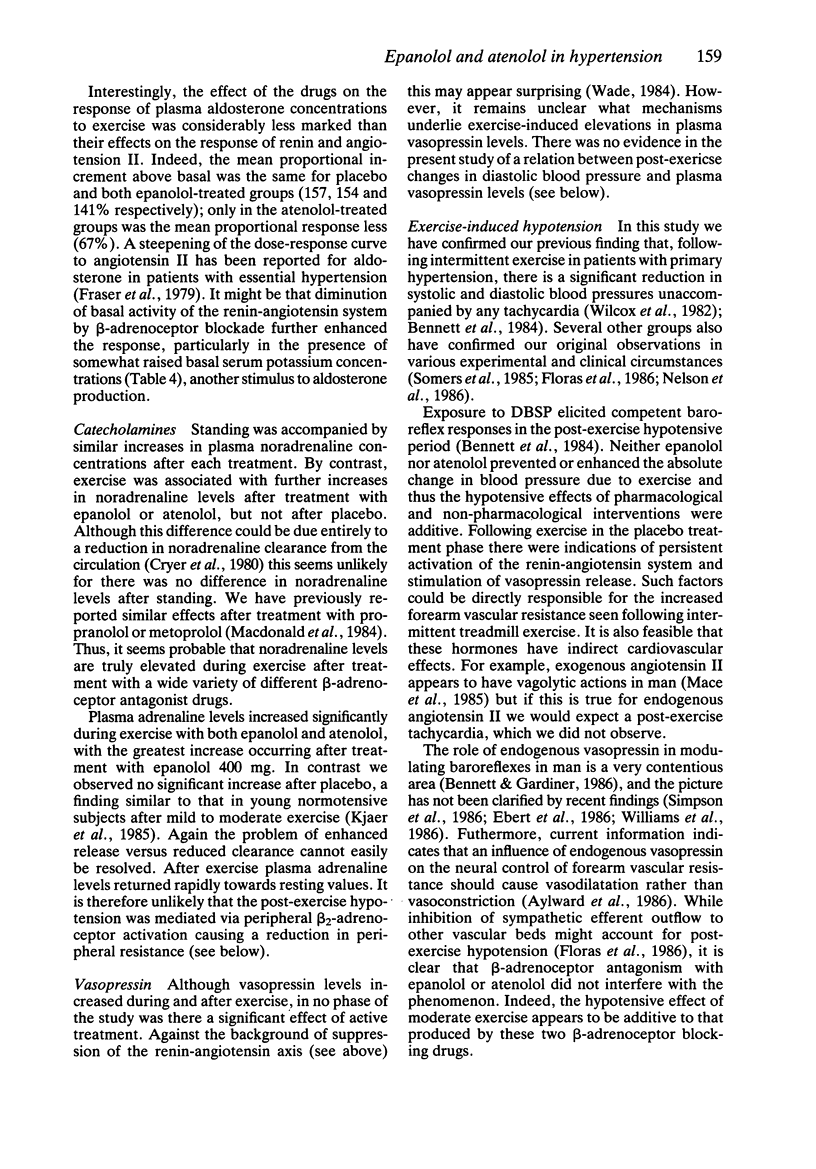
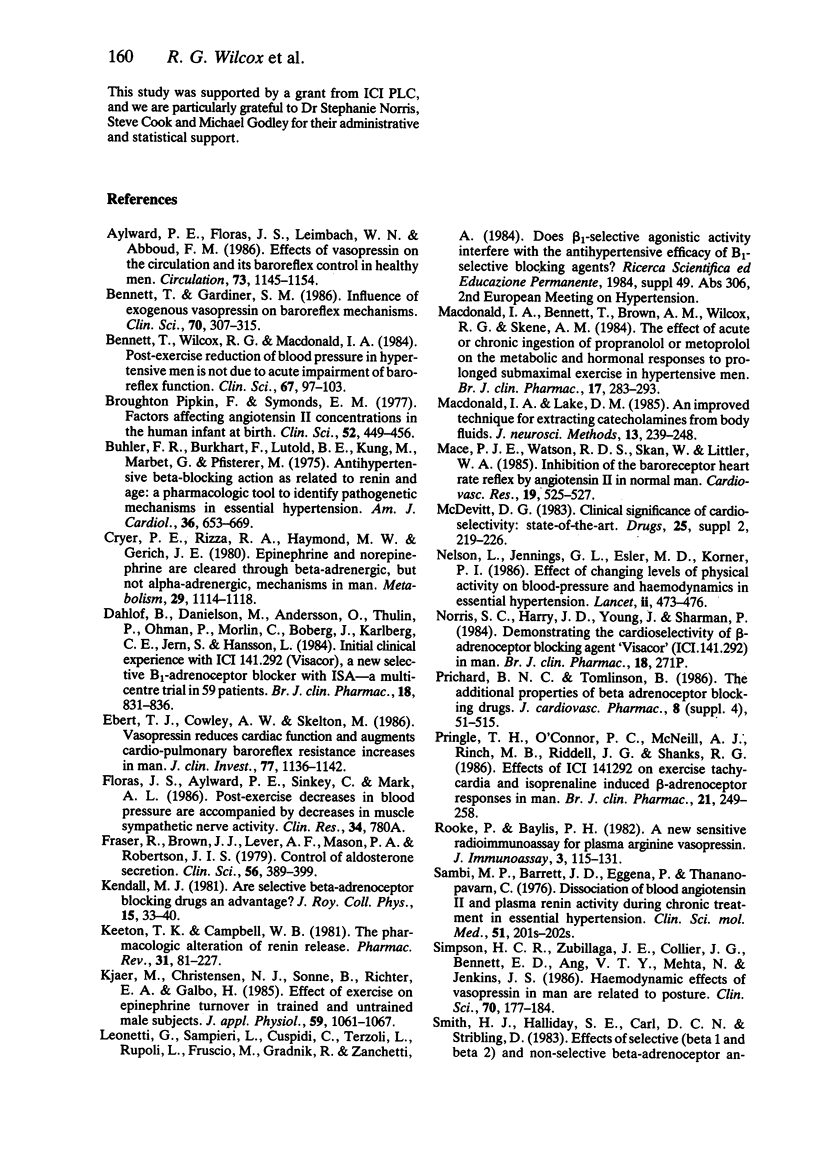
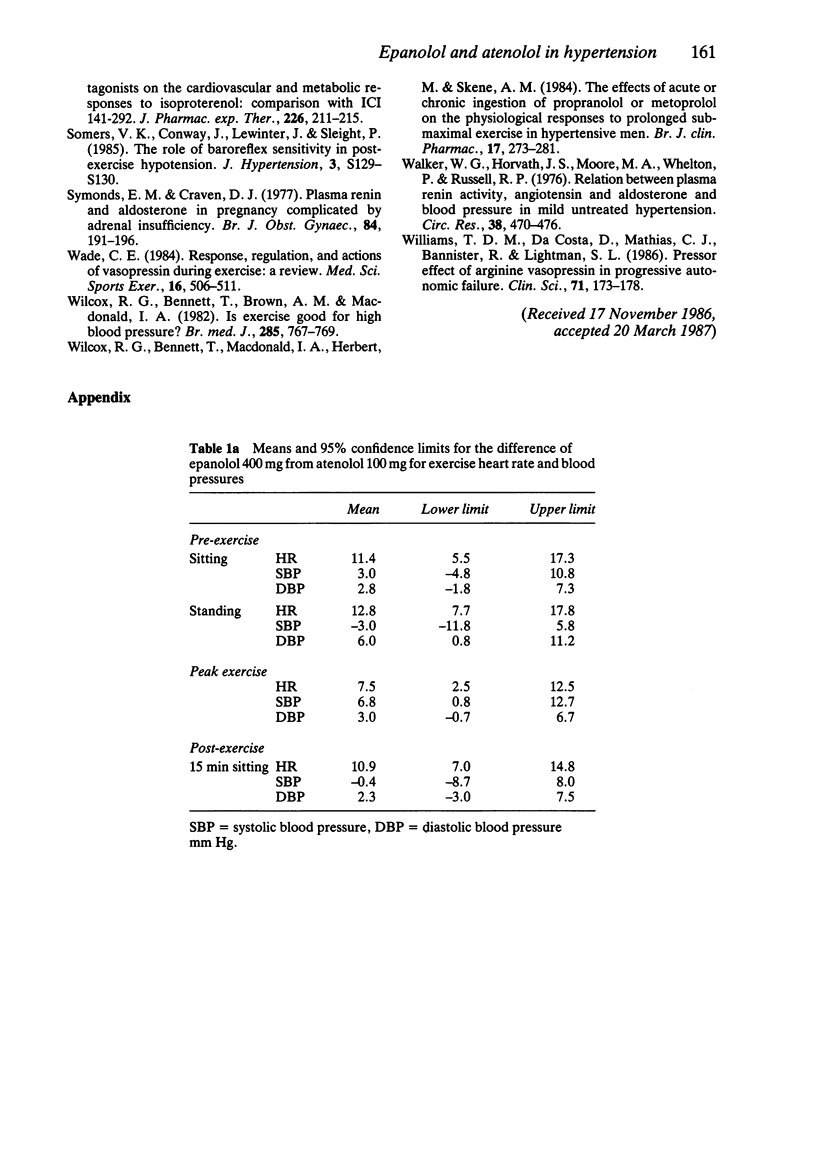
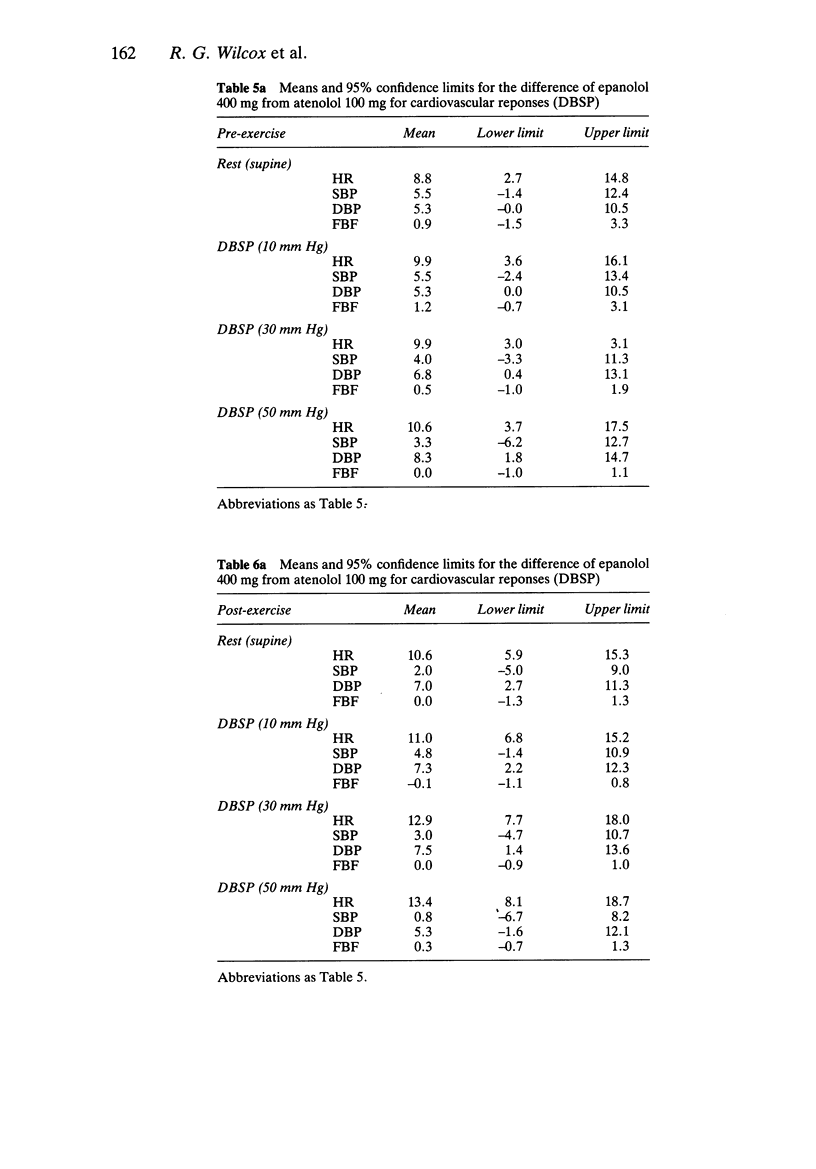
Selected References
These references are in PubMed. This may not be the complete list of references from this article.
- Aylward P. E., Floras J. S., Leimbach W. N., Jr, Abboud F. M. Effects of vasopressin on the circulation and its baroreflex control in healthy men. Circulation. 1986 Jun;73(6):1145–1154. doi: 10.1161/01.cir.73.6.1145. [DOI] [PubMed] [Google Scholar]
- Bennett T., Gardiner S. M. Influence of exogenous vasopressin on baroreflex mechanisms. Clin Sci (Lond) 1986 Apr;70(4):307–315. doi: 10.1042/cs0700307. [DOI] [PubMed] [Google Scholar]
- Bennett T., Wilcox R. G., Macdonald I. A. Post-exercise reduction of blood pressure in hypertensive men is not due to acute impairment of baroreflex function. Clin Sci (Lond) 1984 Jul;67(1):97–103. doi: 10.1042/cs0670097. [DOI] [PubMed] [Google Scholar]
- Bühler F. R., Burkart F., Lütold B. E., Küng M., Marbet G., Pfisterer M. Antihypertensive beta blocking action as related to renin and age: a pharmacologic tool to identify pathogenetic mechanisms in essential hypertension. Am J Cardiol. 1975 Oct 31;36(5):653–669. doi: 10.1016/0002-9149(75)90168-x. [DOI] [PubMed] [Google Scholar]
- Cryer P. E., Rizza R. A., Haymond M. W., Gerich J. E. Epinephrine and norepinephrine are cleared through beta-adrenergic, but not alpha-adrenergic, mechanisms in man. Metabolism. 1980 Nov;29(11 Suppl 1):1114–1118. doi: 10.1016/0026-0495(80)90019-0. [DOI] [PubMed] [Google Scholar]
- Dahlöf B., Danielson M., Andersson O., Thulin T., Ohman P., Mörlin C., Boberg J., Karlberg B. E., Jern S., Hansson L. Initial clinical experience with ICI 141,292 (Visacor), a new selective beta 1-adrenoceptor blocker with ISA--a multicentre trial in 59 patients. Br J Clin Pharmacol. 1984 Dec;18(6):831–836. doi: 10.1111/j.1365-2125.1984.tb02552.x. [DOI] [PMC free article] [PubMed] [Google Scholar]
- Ebert T. J., Cowley A. W., Jr, Skelton M. Vasopressin reduces cardiac function and augments cardiopulmonary baroreflex resistance increases in man. J Clin Invest. 1986 Apr;77(4):1136–1142. doi: 10.1172/JCI112413. [DOI] [PMC free article] [PubMed] [Google Scholar]
- Fraser R., Brown J. J., Lever A. F., Mason P. A., Robertson J. I. Control of aldosterone secretion. Clin Sci (Lond) 1979 May;56(5):389–399. doi: 10.1042/cs0560389. [DOI] [PubMed] [Google Scholar]
- Kendall M. J. Are selective beta-adrenoceptor blocking drugs an advantage? J R Coll Physicians Lond. 1981 Jan;15(1):33–40. [PMC free article] [PubMed] [Google Scholar]
- Kjaer M., Christensen N. J., Sonne B., Richter E. A., Galbo H. Effect of exercise on epinephrine turnover in trained and untrained male subjects. J Appl Physiol (1985) 1985 Oct;59(4):1061–1067. doi: 10.1152/jappl.1985.59.4.1061. [DOI] [PubMed] [Google Scholar]
- Macdonald I. A., Bennett T., Brown A. M., Wilcox R. G., Skene A. M. The effects of acute or chronic ingestion of propranolol or metoprolol on the metabolic and hormonal responses to prolonged, submaximal exercise in hypertensive men. Br J Clin Pharmacol. 1984 Mar;17(3):283–293. doi: 10.1111/j.1365-2125.1984.tb02343.x. [DOI] [PMC free article] [PubMed] [Google Scholar]
- Macdonald I. A., Lake D. M. An improved technique for extracting catecholamines from body fluids. J Neurosci Methods. 1985 May;13(3-4):239–248. doi: 10.1016/0165-0270(85)90072-x. [DOI] [PubMed] [Google Scholar]
- Mace P. J., Watson R. D., Skan W., Littler W. A. Inhibition of the baroreceptor heart rate reflex by angiotensin II in normal man. Cardiovasc Res. 1985 Sep;19(9):525–527. doi: 10.1093/cvr/19.9.525. [DOI] [PubMed] [Google Scholar]
- Nelson L., Jennings G. L., Esler M. D., Korner P. I. Effect of changing levels of physical activity on blood-pressure and haemodynamics in essential hypertension. Lancet. 1986 Aug 30;2(8505):473–476. doi: 10.1016/s0140-6736(86)90354-5. [DOI] [PubMed] [Google Scholar]
- Nicholls D. P., McNeill J., Harron D. W., Shanks R. G. Cardiovascular effects of pinacidil and propranolol alone and in combination in normal humans. J Cardiovasc Pharmacol. 1986 Jan-Feb;8(1):51–54. doi: 10.1097/00005344-198601000-00008. [DOI] [PubMed] [Google Scholar]
- Pringle T. H., O'Connor P. C., McNeill A. J., Finch M. B., Riddell J. G., Shanks R. G. Effects of ICI 141,292 on exercise tachycardia and isoprenaline-induced beta-adrenoceptor responses in man. Br J Clin Pharmacol. 1986 Mar;21(3):249–258. doi: 10.1111/j.1365-2125.1986.tb05187.x. [DOI] [PMC free article] [PubMed] [Google Scholar]
- Rooke P., Baylis P. H. A new sensitive radioimmunoassay for plasma arginine vasopressin. J Immunoassay. 1982;3(2):115–131. doi: 10.1080/15321818208056990. [DOI] [PubMed] [Google Scholar]
- Sambhi M. P., Barrett J. D., Eggena P., Thananopavarn C. Dissociation of blood angiotensin II and plasma renin activity during chronic treatment in essential hypertension. Clin Sci Mol Med Suppl. 1976 Dec;3:201s–202s. doi: 10.1042/cs051201s. [DOI] [PubMed] [Google Scholar]
- Simpson H. C., Zubillaga J. E., Collier J. G., Bennett E. D., Ang V. T., Mehta N., Jenkins J. S. Haemodynamic effects of vasopressin in man are related to posture. Clin Sci (Lond) 1986 Feb;70(2):177–184. doi: 10.1042/cs0700177. [DOI] [PubMed] [Google Scholar]
- Smith H. J., Halliday S. E., Earl D. C., Stribling D. Effects of selective (beta-1 and beta-2) and nonselective beta adrenoceptor antagonists on the cardiovascular and metabolic responses to isoproterenol: comparison with ICI 141,292. J Pharmacol Exp Ther. 1983 Jul;226(1):211–216. [PubMed] [Google Scholar]
- Somers V. K., Conway J., LeWinter M., Sleight P. The role of baroreflex sensitivity in post-exercise hypotension. J Hypertens Suppl. 1985 Dec;3(3):S129–S130. [PubMed] [Google Scholar]
- Symonds E. M., Craven D. J. Plasma renin and aldosterone in pregnancy complicated by adrenal insufficiency. Br J Obstet Gynaecol. 1977 Mar;84(3):191–196. doi: 10.1111/j.1471-0528.1977.tb12554.x. [DOI] [PubMed] [Google Scholar]
- Wade C. E. Response, regulation, and actions of vasopressin during exercise: a review. Med Sci Sports Exerc. 1984 Oct;16(5):506–511. doi: 10.1249/00005768-198410000-00015. [DOI] [PubMed] [Google Scholar]
- Walker W. G., Horvath J. S., Moore M. A., Whelton P., Russell R. P. Relation between plasma renin activity, angiotensin, and aldosterone and blood pressure in mild untreated hypertension. Circ Res. 1976 Jun;38(6):470–476. doi: 10.1161/01.res.38.6.470. [DOI] [PubMed] [Google Scholar]
- Wilcox R. G., Bennett T., Brown A. M., Macdonald I. A. Is exercise good for high blood pressure? Br Med J (Clin Res Ed) 1982 Sep 18;285(6344):767–769. doi: 10.1136/bmj.285.6344.767. [DOI] [PMC free article] [PubMed] [Google Scholar]
- Wilcox R. G., Bennett T., Macdonald I. A., Herbert M., Skene A. M. The effects of acute or chronic ingestion of propranolol or metoprolol on the physiological responses to prolonged, submaximal exercise in hypertensive men. Br J Clin Pharmacol. 1984 Mar;17(3):273–281. doi: 10.1111/j.1365-2125.1984.tb02342.x. [DOI] [PMC free article] [PubMed] [Google Scholar]
- Williams T. D., Da Costa D., Mathias C. J., Bannister R., Lightman S. L. Pressor effect of arginine vasopressin in progressive autonomic failure. Clin Sci (Lond) 1986 Aug;71(2):173–178. doi: 10.1042/cs0710173. [DOI] [PubMed] [Google Scholar]


